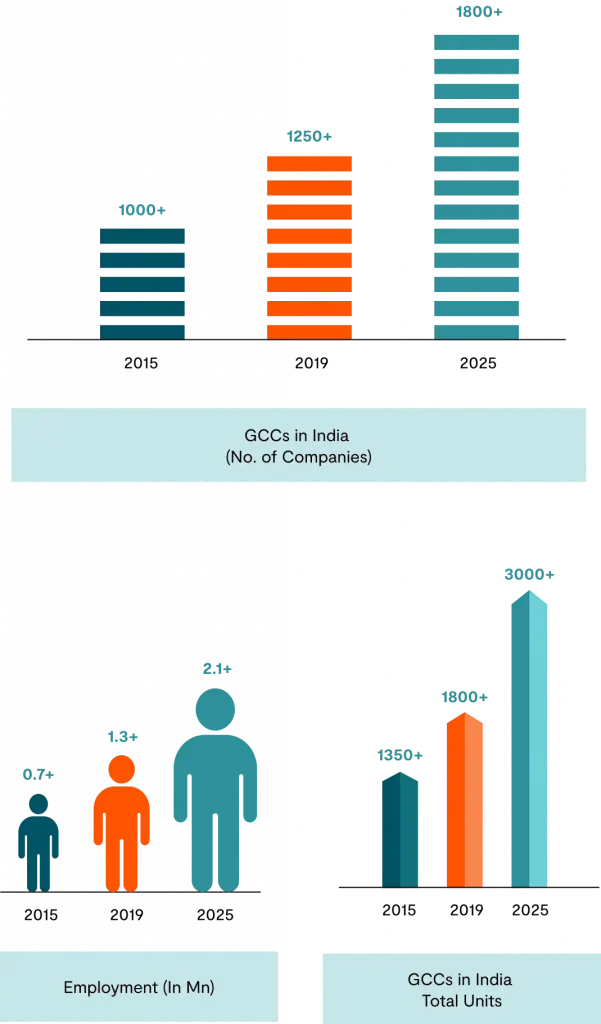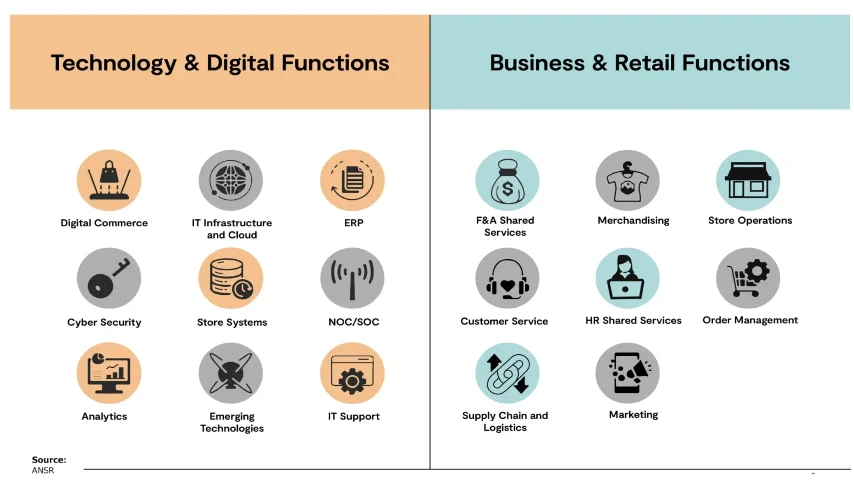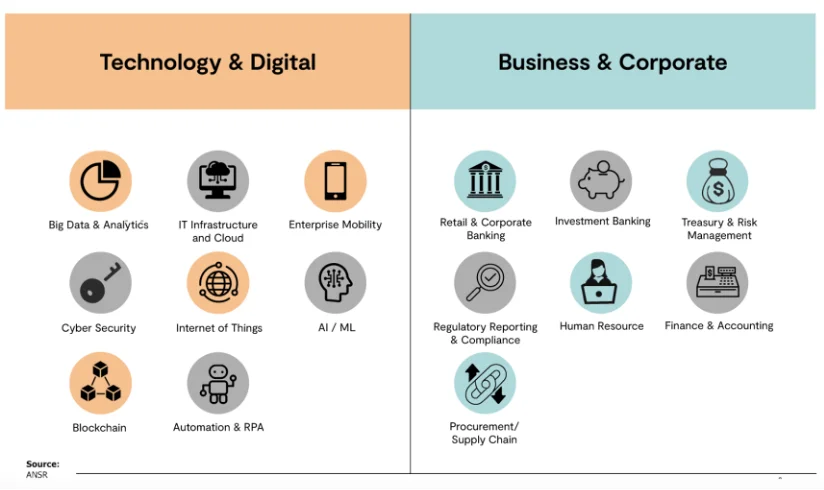About Global Capability Center
Growth Beyond Borders.
In a world where change is the only constant, enterprises that can successfully adapt to evolving customer expectations and advancements in technology are bound to succeed. That’s where Global Capability Centers (GCCs) come in, acting as strategic assets that enable organizations to drive cutting edge innovation, increase operational efficiency, and access top-tier talent across the world.
What is a Global Capability Center?
GCCs, also referred to as captive centers, shared service centers, or global in-house centers, are wholly-owned, integrated facilities strategically located in talent-rich regions. By leveraging a combination of highly skilled talent and advanced technologies (Al, machine learning, analytics), GCCs help enterprises build diverse capabilities, increase operational efficiency, and drive exponential growth.
From powering digital transformation at an organization-wide level, to helping build specific products and entire functions, a GCC is designed as a core enabler for the organization. A GCC may also serve as Center of Excellence, providing specialized expertise and best practices that enhance organizational performance and innovation.

The GCC Advantage

Accelerating Digital Transformation

Increasing Operational Efficiency

Building New Products and Capabilities

Driving Organizational-wide Innovation

Powering Core Business Functionalities
Access top-tier global talent pools | Boost efficiency through standardized operations | Foster innovation and build new capabilities | Power core goals with business agility
India’s Rise as the World’s GCC Powerhouse
With over 1800 GCCs that employ 2M+ professionals, India’s is home to almost 50% of the world’s total Global Capability Centers. Here’s why leaders across every industry are actively choosing India for establishing their GCCs:
- Highly Skilled, Diverse Talent: India’s pool of highly skilled technical as well as non-technical talent is one of its key advantages. From engineers and developers to cybersecurity, cloud and crypto specialists – India’s talent pool remains unbeaten.
- Robust Digital Infrastructure: India’s deep technology penetration and internet connectivity makes it possible to build teams even in tier-2 and 3 cities.
- Innovation Ecosystem: India’s thriving start-up culture, numerous research institutions and tech partnerships create the ideal innovation ecosystem.
- Governmental Support: From tax-rebates and SEZ benefits, to proactive investment in digital infrastructure, India’s government proactively incentivises MNCs to setup their GCCs in the country.
- Skill Arbitrage: As compared to acquiring skilled talent in Northern America or Europe, India offers significant savings in operational and talent costs without compromising quality or capability

Different Models of GCC Setup
Within GCCs, there exist different models of setup, depending on the level of control, initial capital investment, and business goals of the company.
Captive Model
Build-Operate-Transter (BOT) Model
Managed Services Model
How to set up a Global capability center in 12 weeks
Ready to take the first step towards building your GCC?
Key Insights
Key Considerations
How is GCC different from Outsourcing?
GCCs differ significantly from traditional outsourcing models in several key ways.
One of the biggest advantages that a GCC has over outsourcing is the unhindered access and control that it provides to the enterprise. GCCs are fully owned and operated by the parent company. This ownership provides greater control over operations, ensuring alignment with corporate strategies and maintenance of quality standards.
Acting as a seamless extension of the parent company, a GCC also ensures the company’s culture and values remain intact.
By building specific capabilities and subject matter expertise in-house, a GCC often acts as a catalyst in driving innovation and change within the entire organization, simultaneously reducing dependence on outside resources.
What roles and functions are typically housed in GCCs?
Depending on the short-term and long-term goals of the enterprise, a GCC can be leveraged for a wide range of roles & functions:
- Technology Center of Excellence: Software Development, Data Analytics, Cybersecurity, Cloud Computing, etc.
- Research & Development: Product innovation, AI/ML, Research & Prototyping, and more
- Business Shared Services: Finance, Marketing, HR, IT, Customer Support, etc.
For instance, companies within the Retail/CPG industry often choose to establish GCCs as a means to achieve digital transformation and finance and merchandising expertise. They typically focus on:

In the banking, finance services, and insurance (BFSI) industry, leaders use GCCs to fortify cybersecurity and augment their core business functions like risk management, capital analysis, review, etc.

Is my Enterprise GCC ready?
GCCs are size-agnostic and benefit companies of all sizes and across industries, with negligible size restrictions. To begin with, an enterprise can start operations with an agile team of 20 members, with the ability to scale it up to a thousand, depending on the requirements of the business. With the GCC model, companies can choose between prioritizing a single function, like technology or finance, or expanding multiple functions simultaneously, delivering tech and non-tech capabilities.
ANSR’s experts can assess your specific needs and determine if a GCC aligns with your strategic vision.
What are the best locations for building a GCC?
Identifying the location for the GCC is driven by a variety of strategic considerations, like the availability of skilled talent, a robust digital infrastructure, and a favorable regulatory environment. As of 2024, the top 5 locations for setting up GCCs are India, Poland, UAE, Vietnam, and Mexico. Apart from these, Argentina, Romania, Brazil, and the Czech Republic are also highly preferred destinations.
Ranking at the top as the GCC capital of the world, India’s vast talent pool, robust technology ecosystem, and thriving startup culture make it the prime GCC destination to drive business growth and innovation. With several world-class peer GCCs, India offers a compelling combination of scalability, a skilled workforce, and cost-effectiveness.
Which companies have a GCC in India?
Some of the biggest and fastest growing companies across every industry, from retail (Walmart, Target, Lowe’s, Saks, Ikea) to specialty fashion (Nike, Lululemon, Victoria’s Secret and Co.), healthcare (Kenvue, Evernorth, Amgen, AstraZenenca, Bristol Myers Squibb, Merck), banking (Morgan Stanley, National Australia Bank, JP Morgan Chase, Goldman Sachs, HSBC), to SaaS companies and tech product companies (Chargebee, Careem, DocuSign, Airbnb) have their global capability centers in India.
How many GCCs are there in India?
As of January 2025, there are over 1700 GCCs in India, with 90% of these set up in the cities of Bengaluru, Chennai, Hyderabad, Delhi NCR, Mumbai and Pune. The total number of GCCs in India is projected to grow to a massive 2200 by the year 2030. The biggest reason companies choose India for their Global Capability Centers is its vast pool of highly skilled, cost-efficient talent across technology, analytics, and innovation domains. India’s robust infrastructure, supportive government policies, and thriving innovation ecosystem further enhance its appeal, enabling companies to drive efficiency, scale operations, and foster innovation while maintaining cost advantages.
What factors should be considered when selecting a location for a GCC?
When selecting a location for setting up a GCC, leaders should evaluate for access to a highly skilled and diverse talent pool, a supportive digital infrastructure, and factors such as the presence of a large ecosystem of service providers, product companies, peer company presence, startups, etc. Enterprises should also consider a region’s stability, government support for multinational companies, regulatory environment, and potential for scalability. These factors ensure your GCC can operate efficiently, adapt to changing demands, and drive sustained growth.
At ANSR, our specialized framework for location strategy meticulously charts every relevant factor – from the availability of talent and robust digital infrastructure to the government policies and regulatory requirements in play at the target location.
What is the purpose of GCCs?
Global Capability Centers (GCCs) help parent companies build specialized capabilities in areas like advanced analytics, AI, R&D, and digital transformation by leveraging skilled talent in cost-effective locations. They centralize operations such as finance, IT, and HR, standardizing processes and driving innovation. By streamlining workflows and adopting scalable technologies, GCCs enhance efficiency while reducing redundancies. This approach enables parent companies to achieve significant cost savings, improve operational agility, and focus on strategic priorities, all while fostering innovation and maintaining global service quality.
What are the benefits of partnering with GCC provider over setting up a GCC independently?
Partnering with provider to establish your GCC offers significant advantages in terms of efficiency, speed, and cost savings. Typically, setting up a legal entity in a new country can take up to 180 days. With an experienced partner, this process is often expedited by 60%, reducing setup time to just 14-90 days.
Typically, the average capital investment for setting up an entity is $6 million, with a payback period stretching up to 32 months. However, working with a partner’s established infrastructure, companies can eliminate upfront capital investment entirely. enterprises can often optimise operating costs by 15% when working with the provider.
ANSR is a leading global teams builder with a ~20 year legacy of providing GCC solutions to the world’s top companies across industries. Our comprehensive, end to end solution streamlines the entire GCC setup process, removing the need to engage with over 60 vendors, which can increase operational efficiency by up to 90%.
What are the key criteria for evaluating a GCC provider?
Your GCC provider plays a crucial role in guaranteeing its success. Here are a few things to keep in mind ~
- Access to talent pool: Talent is often the primary driver for setting up GCCs. Assess the provider’s access to a GCC-ready talent pool and the ability to recruit the right talent for your needs rapidly. Additionally, consider how efficiently they can scale your GCC as your operations grow.
- Relevant experience and expertise: Check if this entity has successfully set up and managed GCCs within your industry. Prior experience within your industry will enable them to anticipate the various challenges and bottlenecks that can occur in the setup of your GCC.
- Service offerings: Dive deeper to carefully understand the entire suite of their offerings, from strategy development and workspace setup to talent acquisition and ongoing operations.
- Technology infrastructure: Collaborating with the HQ and other locations will provide seamless communication tools and technology infrastructure, so ensure the presence of these tools for seamless operations.
- Client references: Testimonials and references from past clients are a good way to understand the scope of the partner’s deliverables and its adeptness at setting up a GCC.
What costs are associated with establishing and maintaining a GCC?
The costs associated with establishing a GCC include initial setup expenses such as facility acquisition, infrastructure development, and talent recruitment. Ongoing maintenance costs encompass salaries, technology upgrades, and operational expenses. ANSR’s end-to-end offering includes a no-Capex, pay-as-you-grow model that significantly enhances ‘time to value’ and neutralizes the risks associated with setting up globally distributed teams.
What are the typical timelines and steps involved in setting up a GCC?
Generally, setting up a GCC can take 6-8 months from the initial date, depending on various factors such as location selection, regulatory approvals, infrastructure setup, talent acquisition, and technology deployment. However, with ANSR’s team of in-house experts, the end-to-end setup of your GCC is completed within 4-6 weeks.
How does ANSR assist in the setup and management of a GCC?
ANSR provides an end-to-end solution for GCC setup
Step 1- GCC Model and Design: Intake, talent intelligence, and strategic consulting for every aspect of setting up the GCC, ultimately culminating into the GCC Operations Playbook.
Step 2 – GCC Solutions and Setup: Setting up and registering a legal entity, talent acquisition, workspace design & setup, and systems configuration to streamline your global operations.
Step 3 – GCC Operations: Complete talent lifecycle management, building the EVP(employee value proposition) and employer branding, onsite IT support, workspace management and finance, and tax & regulatory compliance.
Explore ANSR’s Offerings / Discover our Full Range of Services
How can I scale my GCC and ensure continued success?
A GCC can be scaled in alignment with the business goals, from expanding into new talent-rich regions through a multi-city approach (establishing independent operations across multiple cities), or a hub-and-spoke approach, which involves setting up a central hub (main office or headquarters) and several smaller satellite offices (spokes). Many companies also explore a combination of metro and non-metro, or tier 1, 2, and 3 cities to extract optimal cost, talent, and infrastructure advantages.
What are the key performance indicators (KPIs) for a successful GCC?
Put simply, the objective of a GCC is to build all the capabilities that an organization requires to power its business objectives – from delivering a hyper-personalized customer experience to building and scaling up its digital capabilities, or any other functionalities. Thus, the KPIs for measuring the success of a GCC would be determined by the purpose of its establishment. In a majority of cases, these KPIs would include operational efficiency, cost savings, talent acquisition and retention, innovation contribution, service quality, and alignment with corporate goals.
The world's best companies are leveraging global capability centers to access top talent and accelerate growth

















Case Studies
- India GCC makes up 40% headcount outside HQs
- Powering 12 critical business functions
- Ramped up from 50-member team to 4300
- Powering core business functions & innovation
- First global capability center (GCC) in Bengaluru,
- With a legacy spanning over 135 years
- Company boasting over 32,000 outlets worldwide
- Journey to establish a Center of Innovation in India







